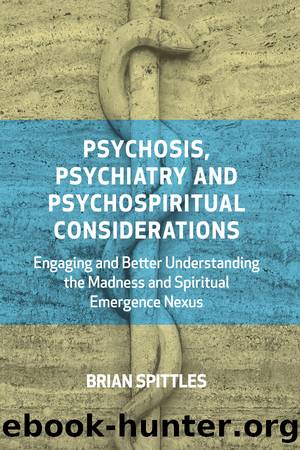Psychosis, Psychiatry and Psychospiritual Considerations by Spittles Brian;

Author:Spittles, Brian;
Language: eng
Format: epub
Publisher: Aeon Books
Published: 2022-12-15T00:00:00+00:00
11.1.1 Voice hearing in mainstream society
As stated above, it appears that voice hearing is a natural human experience that can occur in both normal and anomalous contexts. Indeed, non-psychopathological views of voice hearing are not new to psychiatric or scientific inquiry. For instance, in the mid-nineteenth century the French psychiatrist Alexandre De Boismont (1859, p. 70) noted that hallucinatory experiences, including voice hearing, were commonplace among sane people and that âthe hallucination of the sound mind may be seen to glide into the hallucination of insanity, without its [sic] being possible always to point out the boundary which separates the one condition from the otherâ. This paradoxically acknowledges the notion of âsane hallucinatory experienceâ, which, apart from a few cultural exceptions, is absent from contemporary psychiatry. That De Boismont perceived his investigation of hallucinations to be of a scientific nature is evident in his comment that âthe intelligent reader ought now to recognize the scientific character of our opinion, and to perceive that it is based on a legitimate induction from a principle inherent in the nature of manâ (ibid., p. 339). Additionally, his book's opening sentence clearly portrays his recognition of the fundamental psychospiritual context of hallucinatory experience: âAt all epochs in the history of man, in every climate, under the most opposite forms of government, and with every variety of religion, we constantly find the same belief in spirits and apparitionsâ (p. 1). He subsequently maintained that the global ubiquity of hallucinations over millennia ârenders their study of the highest importanceâ (p. 8). Rather than depicting hallucinations (including the auditory variety) as reified and meaningless diagnostic criteria to be used for discerning states of psychopathology, he described them as natural human phenomena that occur in both states of sanity and insanity. Furthermore, he held that it is difficult, if not impossible, to discern sane from insane voice hearing and that it is imperative that psychiatry strives to attain a deeper understanding of such experiences. Intriguingly, this view from nascent psychiatry is ostensibly closer to better understanding the nature of psychosis, and its attendant symptomatology, than is contemporary psychiatry with its strong biogenic focus.
De Boismont, however, has not been the only investigator to view voice hearing as being common to both normality and insanity. Later in the nineteenth century, two censuses were conducted by psychologists seeking to provide empirical data regarding the incidence of hallucinatory experiences among sane people. First, Gurney et al. (1886a, p. xxxi) undertook research in 1883, via the methodology of a census, which sought to ascertain the incidence of âtransient hallucinations of the saneâ. They found that âof the 5705 persons who have been asked the question,117 it appears that 96 have, within the last 12 years, when awake, experienced an auditory hallucination of a voiceâ (Gurney et al., 1886b, p. 12). This was about 1.7 per cent of respondents. Soon after, Sidgwick et al. (1894, p. 25) conducted a âstatistical inquiry into the spontaneous hallucinations of the saneâ with 17,000 people, via census, over a three-year period.
Download
This site does not store any files on its server. We only index and link to content provided by other sites. Please contact the content providers to delete copyright contents if any and email us, we'll remove relevant links or contents immediately.
Spare by Prince Harry The Duke of Sussex(5177)
Machine Learning at Scale with H2O by Gregory Keys | David Whiting(4295)
Fairy Tale by Stephen King(3370)
Will by Will Smith(2911)
The Bullet Journal Method by Ryder Carroll(2561)
Hooked: A Dark, Contemporary Romance (Never After Series) by Emily McIntire(2550)
Rationality by Steven Pinker(2352)
It Starts With Us (It Ends with Us #2) by Colleen Hoover(2344)
Can't Hurt Me: Master Your Mind and Defy the Odds - Clean Edition by David Goggins(2324)
Friends, Lovers, and the Big Terrible Thing by Matthew Perry(2219)
The Becoming by Nora Roberts(2188)
Love on the Brain by Ali Hazelwood(2062)
A Short History of War by Jeremy Black(1842)
The Strength In Our Scars by Bianca Sparacino(1841)
HBR's 10 Must Reads 2022 by Harvard Business Review(1839)
Leviathan Falls (The Expanse Book 9) by James S. A. Corey(1727)
A Game of Thrones (The Illustrated Edition) by George R. R. Martin(1722)
515945210 by Unknown(1660)
Bewilderment by Richard Powers(1609)
